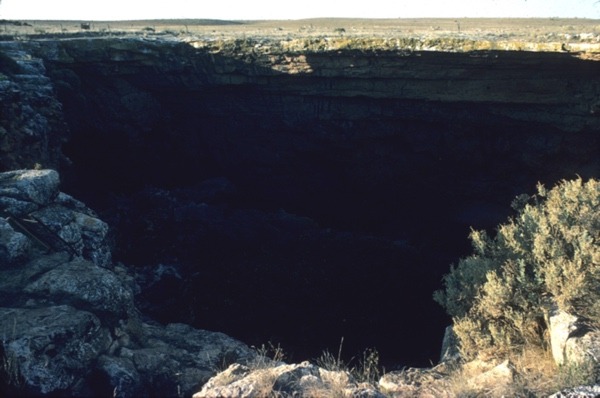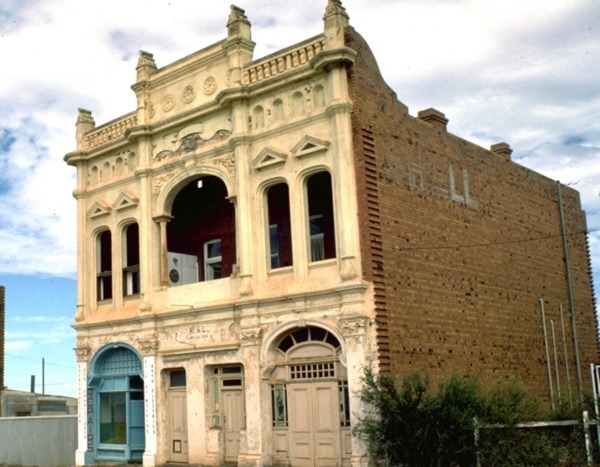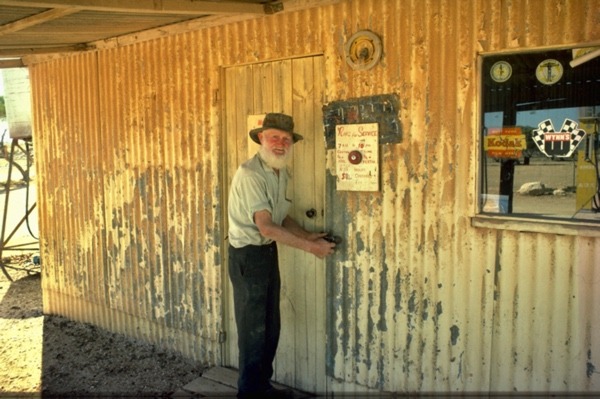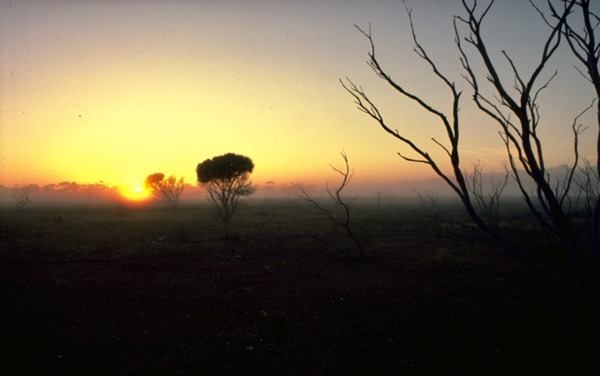Articles published in June, 2024
 Here’s a picture of Gurney’s hole in the ground that I wrote about last week – where he had his orchard.
Here’s a picture of Gurney’s hole in the ground that I wrote about last week – where he had his orchard.
Thursday, April 8th
To Norseman. Exchanged thoughts while riding. Carol was on a “bummer” about something she’d written home and wished she hadn’t.
I was figuring out distillation plants from sea water using solar energy or burning slash from the bush. Much attracted by idea of a coastline as desolate as this must be, yet potentially so fertile. Lovely salmon gums in salmon-pink earth.
[The road to Norseman runs along the east and, as usual, I spent the time wondering how to make it habitable, and wondering what kind of life one could live here. Then suddenly, in late afternoon, I felt tremors through the handlebars and stopped just in time. All but two of the spokes on the left side of the rear wheel had gone, and the wheel was about to collapse. Fortunately, I had recently acquired new spokes and I set about rebuilding the wheel, a job I had never done before. As soon as we stopped moving swarms of mosquitoes attacked us.]
Horrible hour and a half battling with flies and mosquitoes.
[But I got the job done, and we arrived at Norseman.]
Friday, April 9th
 One last remaining building from the gold rush days of Coolgardie
One last remaining building from the gold rush days of Coolgardie
Bill leaves us for Perth. Off to Kalgoorlie, Coolgardie, and as far as Merredin. Carol burned out and hysterical but comes round. Lightening skies. Amazing smoky red sky behind rain clouds and streamers. Stopped at a pub and watch a party of lads talking and drinking. Two wore the same black t-shirts – one was very muscular and male model-y, with his quizzical smiles and profiles. The other a blonde buck-toothed boy with sweet feminine smile. Lots of touching. He was the only one who didn’t have aboriginal blood. One guy, absolutely plastered, wandered around with a jug of beer.
[I can only hope that I was more sympathetic to Carol than my notes seem to suggest.]
Saturday, April 10th
Into Perth. Straight through suburbs to Mosman Park, where found Bill tinkering with his bikes. We went off to a fine pub lunch, and then my first game of Australian Rules, which seemed an exciting enough game, but too formless after soccer. The goal referee with his ridiculous movements of the fingers ¬– and the flags – wears a white trilby and coat.
Gerry Rafferty and Bruce stoning themselves in the kitchen. He’s the drummer. Astrid, the daughter, Leslie and Paul are Rhodesian expatriates working for Zimbabwe, but Perth is so far from anywhere.
Terrible winds and rain lash the house at night and during the day.
The city seems as tho’ it might be a good one to live in – but can’t see that it compares for interest with Melbourne, or for tranquility with Adelaide. But then I saw very little.
Arrived with the engine once again in chaos, the cylinder sleeves scored and an exhaust valve burned out, once again it seems from dirty air, though this time the fractured manifold may have caused overheating as well.
[It astonishes me still that nowhere did any of the mechanics who helped me throughout my journey suggest doing something about air filters, when the one I had was so obviously inadequate.]
Norman Bennett (the Lucas man) was in hospital after a car crash, as well as having his mouth sewn up for a skin graft. Mervyn Whitehead helps me through to Matlock’s and I have the good fortune to meet Dave Waldren there (from Hornsey – ex-copper) who came over with wife Jan on a Suzuki 125 two years ago and worked his way up to being service manager. He does everything to get hold of parts and helps rebuild the bike in a frantic burst to beat the loading time for the ship.
After this we sailed for Singapore on the less-than-good ship Kota Bali – so that was Australia.
I’m off to the Adventure Bike Rally in the UK next week and I’m giving myself a little holiday from my usual holiday, so you might not hear from me for a week or two.
‘Till then, Cheers
Ted
We left Ceduna, and André’s garage, on April 6th to take the road across the Nullarbor plain.
Strangely there is almost nothing in my diary about this part of the journey, although after almost fifty years some of it is vividly memorable, so I will abandon the normal format of this series and just describe it as I remember it.
The next township of any note, so far as we knew, was Eucla, on the state boundary between South Australia and Western Australia. That was about 500 miles away.
We had met nobody coming the other way, so we had no current information of the state of the road, but we had gathered plenty of alarming prophecies. So far as we knew it was all dirt. Kangaroos, bulldust and road trains would be the principal dangers. Bulldust, they said, was thin powdered rock that filled huge potholes so that you wouldn’t know they were there until you fell into them; families of kangaroos would charge across the road unannounced and knock you down, most probably into a large pothole; and road trains – well, obviously you need to get out of the way in time because they don’t stop.
We had no information about fuel stops and had to assume there were none. Since my range on a full tank was about 300 miles, I must have been carrying extra, but my diary says nothing about it.
What we discovered after we got going was that a lot more of the road had been sealed than we expected, and when it did turn to dirt it was quite manageable – certainly nothing like as bad as the mountain roads of Ethiopia.
There were only 200 miles of dirt road left, and halfway across them we met Mr. Gurney. He was a spry, elderly gent with a big white beard, and he had a tin shack by the side of the road where he sold petrol. He lived with his wife (whom we never saw) in a ramshackle bungalow, with some emus, a pet wombat, and some other more familiar animals. It was there that I learned the wombat, a substantial animal, has a sense of humour. It likes to get between your legs and suddenly spin, tossing you to the ground.

Mr Gurney at his Kunaldra Station
Gurney said he owned eleven hundred square miles of Australia, but it was of no value to him because the only drinkable water was found in a cave near his dwelling. It was the cave we wanted to see, but he was reluctant to show us – “not since those three blokes with guns. They were sitting down there firing rifles at the roof. Mad drunk or something.”
But we persuaded him that we were safe. The Nullabor is quite flat, so we clambered down a crater. As I wrote in Jupiter’s Travels:
“Miraculously, at the bottom of the crater among rocks and boulders Gurney had an orchard, the only place where fruit trees could survive the heat. The cave is a series of great caverns, and an important experience, for it suggests that the whole plain must be largely hollow. Indeed there’s a theory – or fancy – that the Southern Ocean flows by subterranean passages to the interior of Australia. At any rate, the hollowness seemed most significant there, because you can feel the earth reverberate when you stamp on it, because emus call to each other by inflating bladders under their croups and making a noise like the underground echo of a steel drum, and because hollowness is a sign of great age. So in the night, half asleep on the ground, listening to the emus drumming and the clank of distant goat bells and not knowing what they were, I thought I was hearing the sound of a great tribal celebration drifting across the plain”.
We spent the night there outside on the ground. We were among the last to travel that road. Later that year a new road, further south, was built and tarred, leaving the Gurneys alone in the wilderness and I have wondered from time time what happened to them. He called his place Kunaldra Station.
On Wednesday, April 7th, my diary says:
Met Bill McGarry at Eucla. Camped out in the bush.

The Nullarbor at dawn
Just like most bikers who have travelled any distance in the last forty years or so I have been well aware of the existence of Touratech.
When I first saw some of their products back in the early nineties – tank bags, boxes, countless clever devices – it was with a very strange and confused mixture of emotions, part admiration, part envy, part regret and part contempt.
I had been riding round the world for four years with none of this stuff, I told myself, and I was proud of having contrived what I needed for myself as I went along with plastic and elastic and bits of this and that: And what about those majestic leather bags, hand stitched in Argentina, that sit astride the tank in the museum today. Of course it’s true that I was happy enough to accept Ken Craven’s fibreglass boxes but still, I would have invented something.
In my mind it was this bare-bones approach to travel that was an essential part of the experience. I was a purist. Just a man on a reasonable bike, wearing recognisable clothes; not a hi-tech phenomenon beamed down from Star Trek.
And then, contradicting myself, I thought if anyone was going to invent stuff to take on a bike through Africa it ought to have been me. I was full of ideas. I should have been Touratech; and then I saw how ridiculous I was being, that the world would go on, with or without me, and I turned to other things.
So when I came to the Touratech Event last weekend, all that history made it especially interesting to me. If you haven’t been yourself, the factory is in an unpronounceable village, Niedereschach, in the Black Forest area of south Germany and is far and away the biggest business there. It was their nineteenth Travel Event, which normally attracts enormous crowds – 17,000 in ’23 I was told – but because it rained comprehensively the entire weekend only a few thousand of the hardiest riders attended.

The hardiest bikers – damp but undaunted
I was invited because I was to be inaugurated as an Honorary Fellow. Being British it’s hard not to laugh, but the heart of the matter is very serious indeed. A strikingly tall and photogenic rider called Dieter Schneider has created something he called the Fellows Ride to combat depression.

The trophy – actually my first ever
It doesn’t surprise me at all to learn that riding a bike is a great antidote to depression, and he organises rides to help overcome what must be a very debilitating state of mind. So even if I couldn’t ride to the event – it was really too far for my scooter – I was all too happy to encourage all those Jolly Good Fellows. Dieter is determined to spread the word beyond Germany and if I can help I will. It’s a Jolly Good Idea.
That was only one of my opportunities to face the crowds this year. I have been enticed to appear yet again at the Adventure Bike Rider Festival at the end of the month. It’s another mammoth event that takes place at Ragley Hall, in Warwickshire. With any luck I’ll have Billy “Biketruck” on the stage to insult me with his fabricated tales of my appalling behaviour. I plan to get back at him this time. And of course I’ll be signing books as well.
I should have been signing books at the Touratech event too. The German translation of my Canary book was supposed to be ready but unfortunately it didn’t get to the printer in time. However, I’m promised that it will make its appearance at the big event, the MRT they call it, in Gieboldehausen at the end of August. I used to go to this meeting regularly, ever since a couple of guys, Ralph and Wolfgang, started it back in the nineties. I remember riding from Sospel, above Nice, to get there in time. I believe it was the longest non-stop ride I’d ever done, around 1,400 Km, and it started on mountain roads in a heavy fog. But I’ve never been interested in endurance riding. I have friends who do “Ironbutt” stuff but, with respect, I think they’re nuts.
And now, going even further back:
FROM MY NOTEBOOKS, Ceduna, Australia 1976
André’s Story
(Word for word, as promised, two weeks ago)
In 1939 he worked in an aircraft engine factory in Paris. (Gnome et Rhone). Then, at least as a skilled man, you earned two or three times what the rest got. He had no father. Was responsible for his mother and family. Lived between Porte d’Italie and Porte d’Orleans. Came war. He stayed at work – reserved occupation. Went on working during occupation. Says the British abandoned France. Promised twenty divisions. Sent only two, and they started the war. Then was trying to escape from romance with an older woman. Took offer of a job in Warsaw. Then another in Russia. Was promised Gaulloises. When they didn’t arrive he protested and resigned. German officer tried to bully him into staying, but A insisted and was given travel papers home via Köln – was even able to visit his uncle there, a POW there, and take him stuff. Then he “disappeared” – – In 1958 he left France in disgust for Australia. Had married a woman, had two children (now both in Australia) but she had mental trouble. Now has no more relations in France. Protests too much. Other reasons for not wanting to go back? In his opinions and personality he reminds me of Papillion’s character.
Next week, the Nullarbor at last.
 Here’s a picture of Gurney’s hole in the ground that I wrote about last week – where he had his orchard.
Here’s a picture of Gurney’s hole in the ground that I wrote about last week – where he had his orchard. One last remaining building from the gold rush days of Coolgardie
One last remaining building from the gold rush days of Coolgardie



